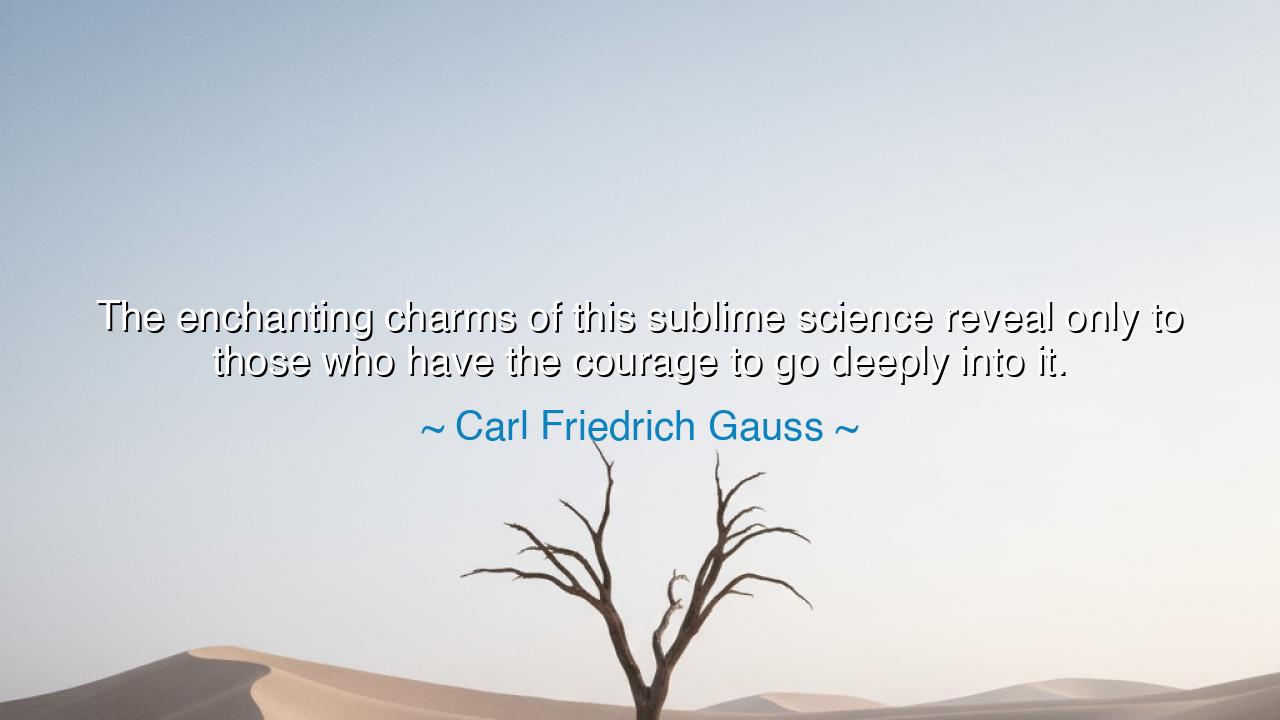
The enchanting charms of this sublime science reveal only to
The enchanting charms of this sublime science reveal only to those who have the courage to go deeply into it.






“The enchanting charms of this sublime science reveal only to those who have the courage to go deeply into it.” — Thus spoke Carl Friedrich Gauss, the prince of mathematicians, whose mind wandered among the constellations of numbers as poets wander among stars. In this saying, Gauss unveils a truth not only about mathematics, but about all forms of wisdom and creation: that the beauty of truth does not reveal itself to the faint-hearted. The treasures of knowledge are not scattered on the surface of the earth for any hand to gather; they are buried deep within the soil of effort, waiting for the one who dares to dig. It is courage, not talent alone, that unlocks the gates of the sublime.
The origin of Gauss’s words lies in his lifelong devotion to the mysteries of mathematics — a science he regarded not as cold or mechanical, but as a living art, radiant with beauty. From childhood, his mind was enchanted by the order and harmony hidden beneath chaos. Yet he knew that the magic of mathematics — its “enchanting charms” — cannot be glimpsed by the casual observer. To perceive its grandeur, one must go beyond mere curiosity into discipline, beyond fascination into devotion. For the realm of truth, like a sacred temple, opens its doors only to those who have purified their intentions through perseverance and passion.
This truth extends far beyond the realm of numbers. The same law governs every art, every science, every pursuit worthy of the soul. To the painter, the canvas reveals its secrets only after years of study; to the philosopher, truth unveils herself only after nights of contemplation and doubt. The divine patterns of the universe do not disclose themselves to the indifferent; they yield only to the seeker who presses forward through confusion and fatigue. Thus, Gauss’s words are a hymn to depth — to the courage to move beyond the surface of things, where the real essence of life resides.
Consider the example of Isaac Newton, who, as a young man, spent long years in solitude, wrestling with the laws of motion and light. He stared at falling apples and distant stars with the same relentless attention, seeking not their appearance but their secret order. He had the courage to go deeply into the workings of nature, while others were content to look and pass by. And in his courage, the universe unfolded its hidden architecture — the “sublime science” of motion, gravity, and celestial harmony. Had he been satisfied with easy answers, the heavens might have remained forever silent to human understanding.
Yet Gauss reminds us that such courage is not without cost. To go deeply into any field — be it art, science, faith, or the study of one’s own soul — is to confront uncertainty, frustration, and even despair. Many turn back when the path grows steep or the goal distant. But the few who endure find what the multitudes never glimpse: the enchantment of mastery, the joy of revelation, the awe of standing face to face with truth. For every deep endeavor transforms the seeker. Courage, then, is not merely the strength to persist, but the humility to surrender to the discipline of the journey.
The lesson of Gauss’s words, therefore, is timeless: that true happiness and wisdom come not from ease, but from depth. A shallow life — filled with distractions, comforts, and idle pleasures — may amuse the senses, but it leaves the spirit hungry. To live deeply is to dare to labor, to question, to study, to feel — to be fully alive to the mystery of existence. Whether one studies mathematics or music, faith or friendship, the reward comes only to those who give their whole heart. The universe hides its most beautiful truths from the lazy and the timid, but it bows before the brave.
So, my listener of the ages, take these words as a compass for your journey. Whatever your craft, your calling, your search — go deeply. Do not be content to skim the surface of life. Enter its depths with courage, even when they seem dark or uncertain. Let your curiosity become devotion, your effort become love. For as Gauss teaches, it is only when we dare to go beyond what is comfortable that the sublime reveals itself — and in that revelation, we find not only knowledge, but wonder.
For those who have the courage to go deeply, life itself becomes a kind of science — not of cold numbers, but of luminous truths. And in the heart of that pursuit lies the greatest enchantment of all: to discover that the universe, vast and mysterious, was waiting not just to be understood, but to be loved.






AAdministratorAdministrator
Welcome, honored guests. Please leave a comment, we will respond soon